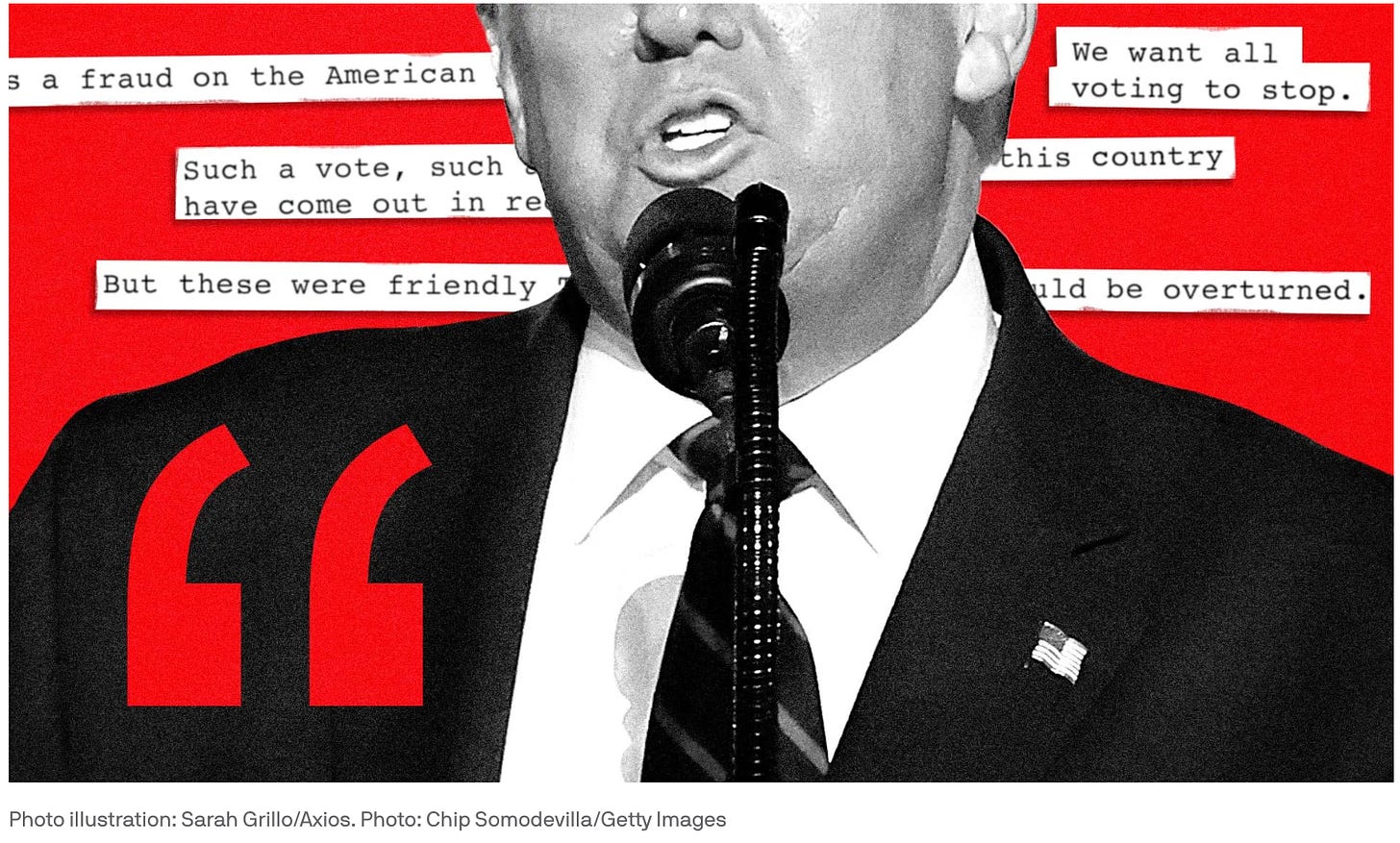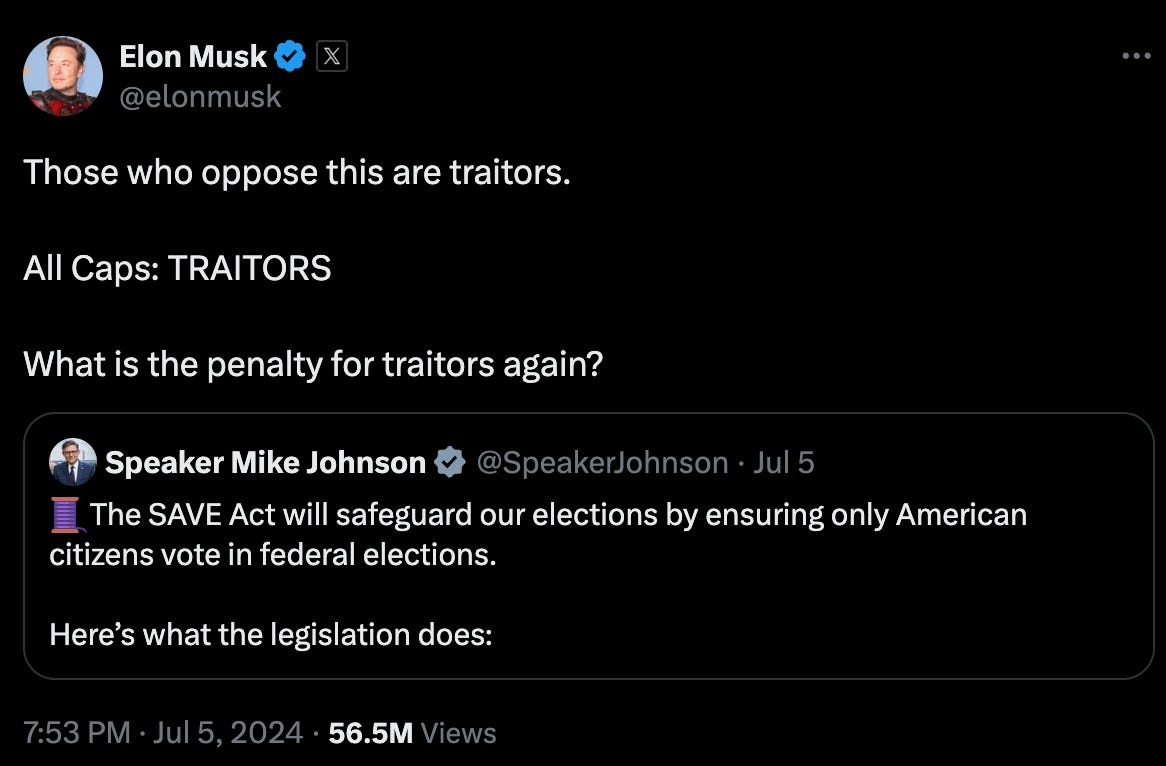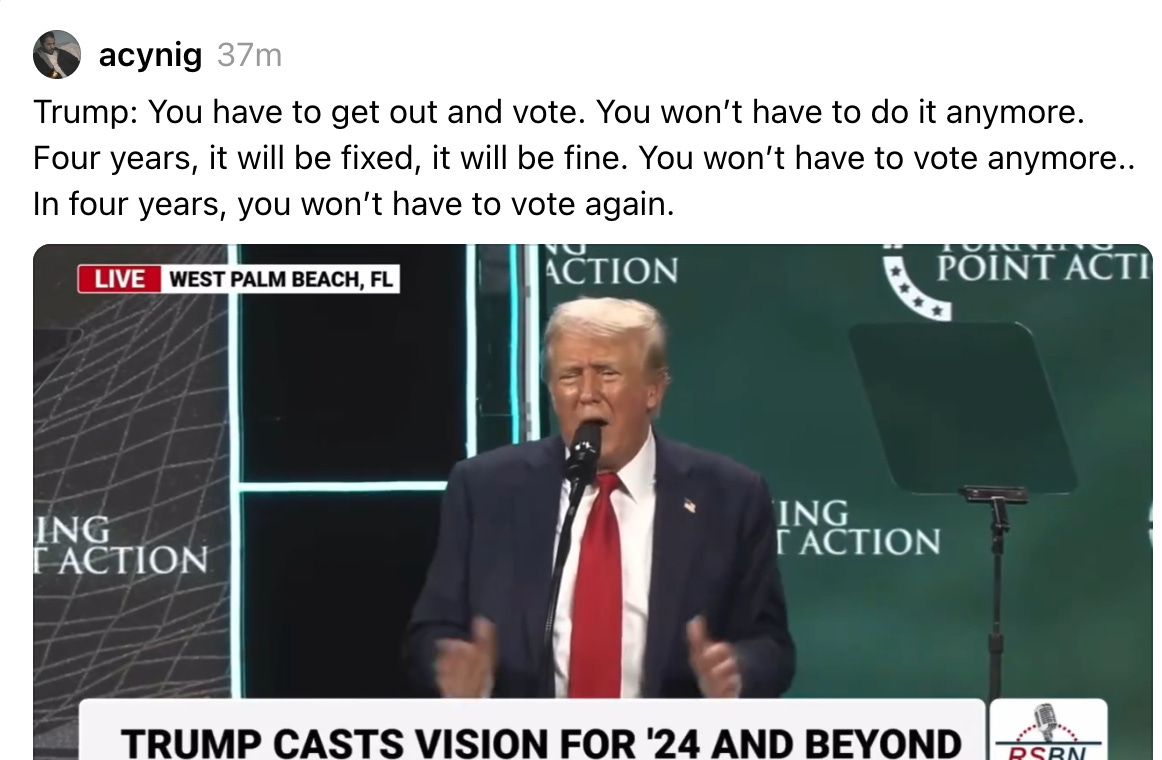As most Americans pay closer attention to presidential polls, another group is taking a different approach, devoting their energy to determining the election outcome in a way that is not reliant on campaigning, or even voting. If their candidate wins, they will abide by the results. But if Trump loses, they have a plan to contest and possibly overturn the outcome.
Once insight from comparative politics research is that failed coups, if not punished, are rehearsals for successful coups. We are seeing this happen right now. If Project 2025 represents a plan for how Trump should govern in a second term, Republican anti-democracy groups have engaged in similar lesson-learning in how to win an election, regardless of what voters actually want.
They plan to do what the January 6 insurrectionists could not, relying on lawsuits rather than violence, and legislative procedures rather than insurrection. It will be no less of an attack on American democracy. Even if they fail, they will leave behind a scorched earth of citizen mistrust and election administration chaos. So lets take a look at some of the tactics they are using.
Projection: Justify Your Actions by Accusing Others of Democratic Attacks
The first tactic the right wing is using is to claim they are actually protecting democracy from radicals, justify their anti-democratic actions. Mike Howell, who is leading an election Oversight Project at the Heritage Foundation boldly declared.
As things stand right now, there’s zero chance of a free and fair election. I’m formally accusing the Biden administration of creating the conditions that most reasonable policymakers and officials cannot in good conscience certify an election.
Part of Howell’s work was organizing tabletop exercises about the 2024 election. They even made up imaginary media news releases about a politicized DOJ and a Biden Stop the Steal campaign. They also worried about Biden arresting opponents of the regime, and political violence. In reality, Trump is the one that has promised to arrest opponents, and the increasingly violent threats against election officials are coming from Trump supporters.
So, sure, if you believe that Biden would behave exactly like Trump, you might conclude that there was no chance of a free and fair election. Now you just have to assume Kamala Harris will behave the same way, even though there is no evidence for it.
A more realistic assumption is that Trump, and only Trump, will behave like Trump. But this would undercut a core belief among his supporters. They claim that they are the ones who are the victims of election fraud. They do this to justify disenfranchising citizens, especially those they believe will support Democrats. Increasingly, however, that is not enough.
Normalizing Anti-Democratic Behavior
Trump helped to normalize the radical nature of the current anti-democratic movement among the right. Early on in the 2016 election cycle, President Trump said he would not accept the results of the election if he lost. As he showed in 2020, he was in earnest, and we should believe him and those around him as they continue to say they will not accept any result where Trump loses.
This election denial was not based on any evidence about the election, but rather Trump’s long-term tendency to claim himself the victim of fraud in any contest he failed to win. Here is an incomplete list of things that Trump has claimed was rigged: the media, internet search results, environmental laws, Congressional hearings, trials in which he was the defendant, and the Emmys in which he did not win an award.
Trump has managed to convert his narcissistic inability to acknowledge defeat into the GOP’s de facto approach to democracy. Now any setback he faces, such as requirements that he appear in court for his misdeeds, or Kamala Harris being the Democratic nominee, is deemed election interference.
Meanwhile, disqualifying real voters is celebrated. If possible, find a technicality to overturn the ballot. If not, change the law by which the ballot was counted. A wave of such legal changes occurred after the 2020 election. Right now, the GOP tactic is to change the law through the courts. For example, lawsuits in Nevada and Mississippi are seeking to remove legal grace periods which allow ballots mailed before election day to still be counted.
We have become numbed by efforts by Republicans to restrict voting. Still, it pales in comparison to the approach of simply ignoring the votes. And that is where we are headed. And to some degree, drawing the distinction between making it harder to vote and not counting the votes is only somewhat useful. The same people, like Cleta Mitchell, declaring that legal votes are fraudulent and that some voters (like college students) should face more burdens in voting are also the ones trying to ignore those votes altogether.
How are they doing this? The most dangerous approach is to create controversy around routine election processes as a justification to throw out the votes. Republicans have turned the ceremonial role of certifying the vote into a new veto point, akin to an advise and consent power where they can choose to substitute their judgement from the findings of election officials. In the aftermath of 147 Republicans refusing to certify the election in 2020 at the federal level, Protect Democracy reports that members of state and local boards have voted against certification more than 20 times. Such votes seem to be more prevalent in battleground states like Georgia, Arizona, Michigan, Nevada and Pennsylvania. America First Legal, Stephen Miller’s legal organization, is suing to give these local officials more power to contest elections. Trump praised Georgia officials that approved a new policy to expand the authority of county officials to contest election outcomes.
Mistrust builds opportunity. Such disputes at the local level serve as the causis belli to justify state or federal officials to claim authority to resolve those disputes. It is entirely plausible to assume that Republican legislators just need the pretext of fraud, delay or disputed outcomes that Trump supporters have created to step in and declare Trump the winner.
Election procedures in states are often run on tight timelines. Nevada is an example where state law allows less than a week to resolve disputes, and Republican legislators could use the missed deadline to reject electoral college votes. At the federal level, electors from states must be declared at least six days before December 17. Failure to submit electors, or the presence of competing electors, may result in votes not being cast for a state, or cast contrary to the actual election results. With enough conflict, and a potential failure of either candidate to reach 270 votes, the House, with a majority Republican legislature, selects the winner. This contingent election process means that the President is selected by the majority of state delegations, not a majority of individual House members. So, California and New York have the same number of votes as Wyoming and Montana. Under such a scenario, it is entirely possible that Trump could lose the election, and Republicans lose the House, but still engineer a way to put Trump back in the White House.
Building a Legal Apparatus to Harass and Sow Doubt
Trump’s efforts to overturn the 2020 election were haphazard. He did, however, have the advantage of incumbency, and tried to use the DOJ to tilt the election in his favor. But he was rebuffed by his own appointees. Even Bill Barr, it turns out, has a line. Others, like Jeffery Clark, were less scrupulous. Clark is now both indicted for his lying to Georgia officials to encourage them to reverse their election determinations; he is also mapping out how a more politicized DOJ would work in a second Trump term.
If Trump no longer has the power of incumbency at the federal level he has, instead, a growing army of loyalists who are preparing strategies to challenge the election in 2024. Next time out, it will not be a last minute scramble. Some of these are the same people involved in 2020. This includes Cleta Mitchell, who was not indicted when helping Trump pressure Georgia officials into reversing the election outcome, and Christina Bobb, an Arizona lawyer who was indicted for her role in trying to overturn the election there. Her mugshot is a deliberate but poor imitation of Trump’s original.
Mitchell and Bobb are no longer outliers. The are now joined by the Heritage Foundation and the Republican National Committee. The Heritage Foundation is the organizer of Project 2025. The head of the RNC emphasized how coordinated the efforts are: “What we need is everybody to be in the same boat, in the same direction and rowing at more or less the same time.” Between the RNC and allied groups well over a hundred lawsuits have been filed, an unprecedented election litigation blitz.
Here, Mitchell is flanked by Speaker Mike Johnson, as they propose a bill, recently passed by the House, to make it illegal for noncitizens to vote.
Since it is already a felony for noncitizens to vote in federal elections, it is reasonable to assume that the there is a bit more to the legislation. One purpose is to launder a little Great Replacement Theory for the rubes. Elon Musk tweeted his support, implying that those who opposed the bill should be executed.
But that is not the only purpose of the bill. It also requires that individuals registering to vote when they apply for new state IDs to provide documentary proof of citizenship. This increases the costs of voter registration. In the past, judges have blocked state citizenship documentation requirements, on the very reasonable basis that they are vastly more likely to disenfranchise citizens rather than discourage non-citizens who already will be reluctant to risk a felony, prison and deportation. A study by the Brennan Center found that 9% of citizens would struggle to show documentary proof of citizenship. Such burdens would be greater for persons of color, students, or homeless populations who have less ready access to documentation.
The bill also encourages state officials to question if voters are indeed citizens and demand proof of such citizenship, while intimidating them into not voting. For example, the Tennessee Secretary of State mailed more than 14,000 voters, telling them that he had information that “your voter information matches with an individual who may not have been a United States citizen at the time of obtaining a Tennessee license or ID card,” while warning them that illegal voting would result in prison or a fine.
Just where the information has come from was not specified, but the practice of using poorly managed lists replete with false positives is an old one, one that can be easily be used to gin up false claims of election fraud. It is also a strategy used by Mitchell’s Election Integrity Network. An ACLU lawyer pointed to the effect of the practice:
It’s had the very distinct effect … of not only just confusing people, but causing fear, intimidating them, and making them feel as if they have done something criminally wrong for exercising their constitutional rights for registering to vote.
Bobb is also working with the RNC to create an army of poll watchers. Having watchers at the polls is generally a good thing, until those poll watchers engage in systematic disruption, and target specific voters. Before 2018, the RNC had been legally barred from using poll watchers for decades because of record of voter suppression. Trump has a history of pushing for poll watchers in Democratic-leaning cities which also have many voters of color. Cleta Mitchell has run coaching sessions for such poll watchers. In 2020, many Trump-aligned poll watchers fanned false claims of election fraud.
The legal harassment goes beyond voters. Lawsuits are also being directed at election clerks, even Republican officials. These lawsuits often make seemingly plausible but false claims, such as the idea that more people are registered than are in the local population (a trick that depends upon using a faulty denominator). Activists call up clerks, telling them that dead people are registered, or seeking to strike registered voters, using other faulty lists. (Mitchell has claimed that 27,000 dead people are registered in Michigan alone, but never produced the evidence in court). According to David Becker of the Center for Election Innovation and Research:
These claims are designed not to change policy between now and November, or to change administrative procedure in elections between now and November, but to seed the ground or claims that an election was stolen.
Undermining Democratic Trust in the Name of Restoring Trust
“The way we honestly think about this is making sure that every legal vote is counted legally” say Republican lawyers who are seeking to change how every legal vote is counted. They also claim that they are working to restore declining trust in elections. Given that the have created this mistrust, it is rather like an arsonist claiming that they will put out fires with a can of kerosene.
Mitchell has spent the last four years forming the Election Integrity Network, which spews conspiracy theories while also successfully pushing Republican officials to abandon legitimate efforts to detect election fraud.
The thing is, claiming mass fraud, or making voting more onerous does not increase trust. States that have added more burdensome processes do not have election systems that are any more trusted. Claims of fraud, even if corrected by fact checkers, actually undermine trust. From Berlinksi et al.:
Using a nationwide survey experiment conducted after the 2018 midterm elections – a time when many prominent Republicans also made unsubstantiated fraud claims – we show that exposure to claims of voter fraud reduces confidence in electoral integrity, though not support for democracy itself. The effects are concentrated among Republicans and Trump approvers. Worryingly, corrective messages from mainstream sources do not measurably reduce the damage these accusations inflict. These results suggest that unsubstantiated voter-fraud claims undermine confidence in elections, particularly when the claims are politically congenial, and that their effects cannot easily be mitigated by fact-checking.
Even If They Don’t Succeed, They Will do Enormous Damage
It may be that none of this will come to pass. If they fail — Trump loses at the ballot box, and then is not installed via some sort of political-judicial coup — the damage to American democracy is still substantial. Fewer and fewer people — mostly Republicans — don’t trust their democracy because their political leaders and media tell them not to. One survey found that only 2 in 10 Republicans were confident that the 2024 election would count votes accurately, compared to 7 out of 10 Democrats. It is concerning to see such polarized distrust of election officials who have, in aggregate, done an excellent job in trying conditions as the administrators of democracy.
Trump losing is therefore going to be greeted with deep distrust. On the other hand, a Trump victory would also empower the movement feeding that distrust, giving them a pathway back into national government. They will become more powerful as a result. Maybe this is what Trump was talking about when he told his supporters that “in four years you don’t have to vote again, we’ll have it fixed so good, your not going to have to vote.”
Part of the problem is that while many of the insurrectionists who entered the Capitol on January 6th were punished, the ringleaders were not. Trump has been in court, but no conviction will come before the election, and the Supreme Court has made any such a conviction much less likely with its blanket presumption of presidential immunity. Republicans looked at impeaching Trump when he was at his weakest moment, but chose not to. The 147 Republicans who voted to overturn the election in 2020 faced no meaningful penalty, while the Republicans who criticized Trump’s anti-democratic behavior have been largely purged from the party.
If a political party, a country and its institutions, cannot create a simple dividing line between those who accept democratic outcomes and those who don’t, the former will sooner or later come under the control of the latter.










Well done, as always, and a pleasure to read.
My concern is: How can both DOJ and FBI investigate and prosecute what are likely federal crimes, up to and including seditious conspiracy when the people and organizations committing the crimes are accusing both the agencies and the political leadership of the same things?
And also: how to organize quickly to counter the voting oversight/voter intimidation and disqualification efforts that have been developed and deployed?
And: How to do all of this without inciting political violence?
Well this was a sobering read the morning after I was on that Zoom with over 150,000 women raising over $2 million for the Kamala Harris campaign.